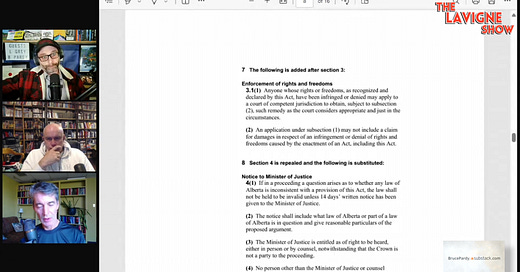Jason Lavigne:
“If there was some sort of emergency and they determined that vaccinations are required, would this [the proposed Alberta Bill of Rights] protect us?”
Bruce Pardy:
The short answer is no. There are layers here. First, let's talk about the distinction between provincial and federal jurisdiction. Nothing that is said in an Alberta Bill of Rights has any effect upon anything within federal jurisdiction. So if the feds pass a statute that is within their powers, as described in the BNA Act, then the Alberta Bill of Rights is irrelevant.
For example, if there's a future occasion when the federal government passes a statute or passes a policy that no one's allowed to fly without a vaccine, the Alberta Bill of Rights is irrelevant. That’s because flights, airlines, transportation between provinces is within the jurisdiction of the federal government.
Second thing is that there is nothing that the Alberta Bill of Rights can say that would prevent the Alberta legislature at a future time from passing anything that it wishes. The only question is to what extent they would have to be explicit about the fact that they are breaching the Bill of Rights.
There is a principle of statutory interpretation that goes “the specific ousts the general”. If you have a general statute like the Bill of Rights that says “here are the general rules for the province and for the law, and everybody should recognize these principles.” That's very broad, it’s good, and should apply to everything and everybody.
But if a future legislature comes along and passes a specific statute about a specific thing, that provides a specific rule that breaches the general rule in the Bill of Rights, then absent any language to the contrary, the courts may very well say, “well look, the legislature has spoken again, and they've spoken specifically.”
The specific ousts the general. Therefore the new statute will prevail and the Bill of Rights does not. There's nothing you can do about that. No wording will affect the fact that no legislature can limit the powers of a future version of itself. Can't be done. So just put that idea aside.
Let’s look at the draft Bill 24. There you see (h) and (i). These are the two subsections that people are thinking give them the right to refuse vaccines. They do not. That is not what they do.
Let's take the first one first. It says “the right of the individual with capacity not to be subjected to or coerced into receiving medical care, medical treatment or medical procedure without the consent of that individual”
We have always had that. We had that during COVID.
This is informed consent. It’s a bitter pill to swallow but let me just be explicit. When people were pushed to get a vaccine, because their jobs were in danger or they couldn't travel or couldn't go to a restaurant or whatever, and they reluctantly went to the doctor's office or the pharmacy to get a vaccine and held their arm out, they were giving consent.
There may be a question about whether the healthcare person gave you enough information to give informed consent. But that's between you and them - between you and the doctor or the nurse. There might be a case of professional negligence if they didn't but that's not about the government. So that section does not change anything. If that section had been in place during Covid, it largely would not have been breached.
So that provides you with no extra protection at all.
The other one “(I) notwithstanding clause H, the right of the individual with capacity not to be subjected to or coerced into receiving a vaccine without the consent of that individual.” People may be thinking, “they can't coerce me into getting a vaccine,” and they think, “well, that means that my job can't be on the line or they can't make me not go on a plane” or the like.
That is not what it means.
If you go to get your vaccine, you're not being coerced in the strict legal sense. Yes, you've got a lot of pressure being put on you. Yes, you're being given bad choices. You're being coerced in the English meaning of the word “coerced”. But it's not legal coercion. Legal coercion, for the most part, exists when the government threatens to fine you or throw you in prison.
If those two things are absent, probably you are not being coerced in the legal sense. So this section does not, DOES NOT, would not, prevent the same kind of scenario from happening again.”
Bruce Pardy is executive director of Rights Probe and professor of law at Queen’s University.
Read Next:
Who Should Decide Your Rights?
I recently appeared on The Lavigne Show with Jason Lavigne and Leighton Grey to discuss the amendment to Alberta’s Bill of Rights: Bill 24. Although this is happening in Alberta, it has repercussions in the Canadian legal landscape. The principles we discuss can be applied in much of the rest of the common law world.









Share this post